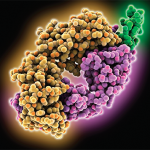GCA Relapse Possible When Discontinuing Tocilizumab

Image Credit: ajt/shutterstock.com
In a Phase 2 randomized, controlled trial, tocilizumab, an anti-IL-6 biologic agent, was shown to induce and maintain remission for up to 52 weeks in patients with giant cell arteritis (GCA).1 During this trial, patients with GCA were randomized in a 2:1 ratio to receive 8 mg/kg bodyweight tocilizumab intravenously plus glucocorticoids (n=20; prednisolone up to 1 mg/kg bodyweight for a maximum of 10 days trial inclusion and the first infusion); or placebo plus glucocorticoids (n=10; prednisolone up to 1 mg/kg body weight for a maximum of 10 days trial inclusion and the first infusion). Sixteen (80%) and seven (70%) patients, respectively, from the tocilizumab vs. placebo treatment of patients had new-onset GCA.
Patients received either treatment every four weeks for 52 weeks. By Week 12, 17 (85%) tocilizumab-treated patients and four (40%) placebo-treated patients achieved complete remission. Relapse-free survival was realized by 17 (85%) tocilizumab-treated patients and two (20%) placebo-treated patients by Week 52.
After Week 52, tocilizumab treatment was discontinued, and subsequent therapy was prescribed by physicians while patients were followed clinically.2 This follow-up study subsequently analyzed patient outcomes after the termination of the Phase 2 trial. Median follow-up time was 12.5 months (range: 3–32 months). After the last tocilizumab dose, 11 patients relapsed, in a median time of five months (range: 2–14 months). In the placebo-treated patients, nine patients relapsed and/or continued glucocorticoid treatment. Interestingly, one of the placebo-treated patients maintained remission throughout the study and was without medication at last follow-up appointment—10 months after Phase 2 study completion.
Of the patients who relapsed, none had blindness, aortic rupture, aortic stenosis or other major vascular complications. Additionally, six of the 11 tocilizumab-treated patients who relapsed after the last study infusion were readministered tocilizumab at the same dose and given monthly intravenous infusions after a median time of 6.5 months (range: 3–14). In two of these tocilizumab-treated patients when the drug was reintroduced, it was stopped after four and six months, with lasting remission. In one of these patients, tocilizumab was reintroduced for two months, stopped and then restarted six months later due to a second relapse.
The authors conclude that clinical and serologic remission in response to monthly, intravenous tocilizumab for 52 weeks does not result in relapse-free survival after treatment termination. Although IL-6 blockade controls the clinical disease, it may not control pathogenesis in all cases and, therefore, requires further study.
Clinical & serologic remission in response to monthly, intravenous tocilizumab for 52 weeks does not result in relapse-free survival after treatment termination. Although IL-6 blockade controls the clinical disease, it may not control pathogenesis in all cases.
FDA Update on Rituximab & Etanercept
The U.S. Food and Drug Administration (FDA) is currently considering an application for a subcutaneous formulation of rituximab. The agency has also approved a supplemental application for etanercept to treat pediatric patients with plaque psoriasis.
FDA Accepts Application for Subcutaneous Rituximab
The FDA has accepted the biologics license application (BLA) for the subcutaneous formulation of rituximab (Rituxan), with an action date of June 26, 2017.3 The BLA was accepted subsequent to updated study results from the Phase 3 SABRINA trial, which compared subcutaneous and intravenous rituximab in previously untreated follicular lymphoma oncology patients. Data from this study were presented at the American Society of Hematology Annual Meeting, Dec. 3–6.
Etanercept Approved for Pediatric Plaque Psoriasis
The FDA has approved the supplemental BLA for etanercept (Enbrel) to treat pediatric patients (ages 4–17) with chronic moderate to severe plaque psoriasis.4 This agent is the first systemic treatment for patients at this age and with this condition. The approval was based on results from a one-year, Phase 3 study along with a five-year, open-label extension study, which evaluated the efficacy and safety of etanercept in patients aged 4–17 with chronic moderate to severe plaque psoriasis.
Adverse events seen in these pediatric patients were similar to those seen in prior studies in adults with moderate to severe plaque psoriasis.
Michele B. Kaufman, PharmD, BCGP, is a freelance medical writer based in New York City and a pharmacist at New York Presbyterian Lower Manhattan Hospital.
References
- Villiger PM, Adler S, Kuchen S, et al. Tocilizumab for induction and maintenance of remission in giant cell arteritis: A Phase 2, randomised, double-blind, placebo-controlled trial. Lancet. 2016; 387(10031):1921–1927.
- Adler S, Reichenbach S, Kuchen S, et al. Termination of tocilizumab treatment in giant cell arteritis: Follow-up of patients after the RCT (ClinicalTrials.gov registration number: NCT01450137) [abstract]. Arthritis Rheumatol. 2016;68 (Suppl 10).
- Genentech Inc. News release: Genentech showcases new clinical data across a variety of blood diseases at American Society of Hematology 2016 Annual Meeting. 2016 Nov 3.
- Amgen Inc. News release: FDA approves expanded use of Enbrel (etanercept) to treat children with chronic moderate to severe plaque psoriasis. FirstWord Pharma. 2016 Nov 4.
Editor’s note: These briefs were previously published on our website.


